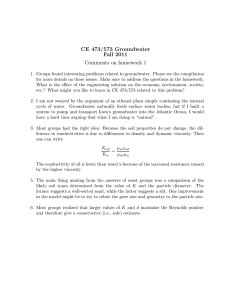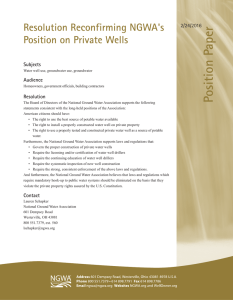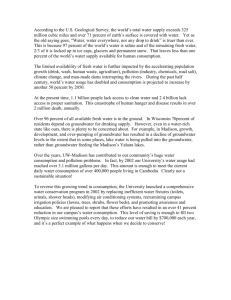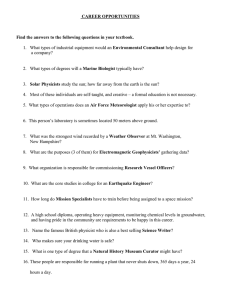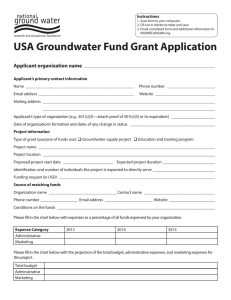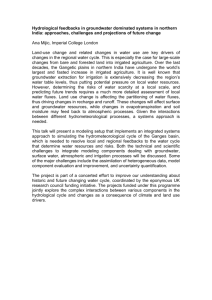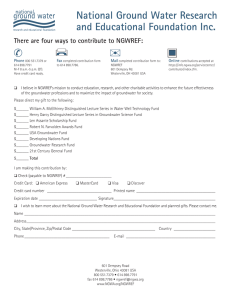Groundwater Use in New Hampshire Groundwater’s Role in Overview New Hampshire’s Economic
advertisement
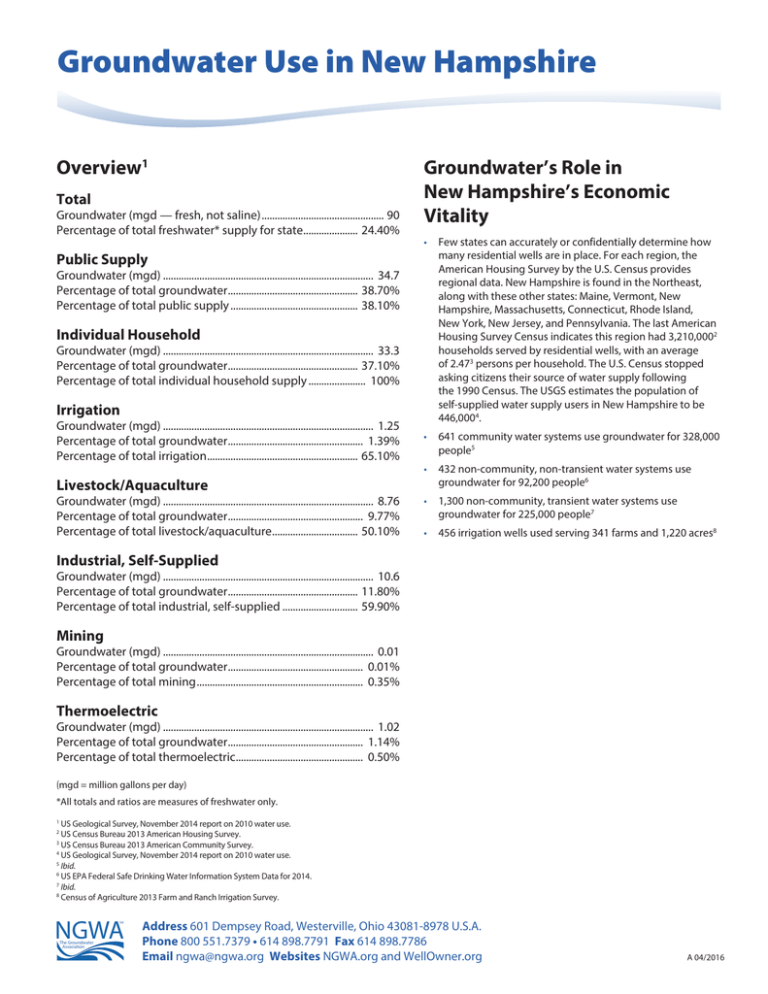
Groundwater Use in New Hampshire Overview1 Total Groundwater (mgd — fresh, not saline)................................................ 90 Percentage of total freshwater* supply for state...................... 24.40% Public Supply Groundwater (mgd).................................................................................. 34.7 Percentage of total groundwater................................................... 38.70% Percentage of total public supply.................................................. 38.10% Individual Household Groundwater (mgd).................................................................................. 33.3 Percentage of total groundwater................................................... 37.10% Percentage of total individual household supply....................... 100% Irrigation Groundwater (mgd).................................................................................. 1.25 Percentage of total groundwater..................................................... 1.39% Percentage of total irrigation........................................................... 65.10% Livestock/Aquaculture Groundwater (mgd).................................................................................. 8.76 Percentage of total groundwater..................................................... 9.77% Percentage of total livestock/aquaculture.................................. 50.10% Groundwater’s Role in New Hampshire’s Economic Vitality • Few states can accurately or confidentially determine how many residential wells are in place. For each region, the American Housing Survey by the U.S. Census provides regional data. New Hampshire is found in the Northeast, along with these other states: Maine, Vermont, New Hampshire, Massachusetts, Connecticut, Rhode Island, New York, New Jersey, and Pennsylvania. The last American Housing Survey Census indicates this region had 3,210,0002 households served by residential wells, with an average of 2.473 persons per household. The U.S. Census stopped asking citizens their source of water supply following the 1990 Census. The USGS estimates the population of self-supplied water supply users in New Hampshire to be 446,0004. • 641 community water systems use groundwater for 328,000 people5 • 432 non-community, non-transient water systems use groundwater for 92,200 people6 • 1,300 non-community, transient water systems use groundwater for 225,000 people7 • 456 irrigation wells used serving 341 farms and 1,220 acres8 Industrial, Self-Supplied Groundwater (mgd).................................................................................. 10.6 Percentage of total groundwater................................................... 11.80% Percentage of total industrial, self-supplied.............................. 59.90% Mining Groundwater (mgd).................................................................................. 0.01 Percentage of total groundwater..................................................... 0.01% Percentage of total mining................................................................. 0.35% Thermoelectric Groundwater (mgd).................................................................................. 1.02 Percentage of total groundwater..................................................... 1.14% Percentage of total thermoelectric.................................................. 0.50% (mgd = million gallons per day) *All totals and ratios are measures of freshwater only. US Geological Survey, November 2014 report on 2010 water use. US Census Bureau 2013 American Housing Survey. 3 US Census Bureau 2013 American Community Survey. 4 US Geological Survey, November 2014 report on 2010 water use. 5 Ibid. 6 US EPA Federal Safe Drinking Water Information System Data for 2014. 7 Ibid. 8 Census of Agriculture 2013 Farm and Ranch Irrigation Survey. 1 2 NGWA SM The Groundwater Association Address 601 Dempsey Road, Westerville, Ohio 43081-8978 U.S.A. Phone 800 551.7379 • 614 898.7791 Fax 614 898.7786 Email ngwa@ngwa.org Websites NGWA.org and WellOwner.org A 04/2016 New Hampshire’s Groundwater Industry Employment Men and women working to provide and protect New Hampshire’s groundwater resources for the benefit of people, business, and our environment. New Hampshire’s Contracting Employment Drill and service water wells, install and service pumps, install and service point of use water treatment devices. This portion of the industry is characterized by small firms, many of which are multi-generation family-owned and operated.9 • 43 firms employ an estimated 585 people10 • Annual estimated sales of $139 New Hampshire’s Scientists and Engineers Employment Geologists, hydrogeologists, engineers, geochemists, geophysicists, microbiologists, regulators. Environmental Consulting11 NAICS 54162: Establishments primarily engaged in providing advice and assistance on environmental issues, such as the control of environmental contamination from pollutants, toxic substances, and hazardous materials. • 148 firms employ an estimated 503 people • Annual estimated sales of $80.3 million Remediation12 NAICS 56291: Establishments include those engaged in remediation and cleanup of contaminated buildings, mine sites, soil, or groundwater. • 43 firms employ an estimated 434 people • Annual estimated sales of $62.8 million Public Service and Universities, Colleges, and Research Centers • Many more dedicated individuals InfoUSA, SIC 1781, March 2015. Barnes Reports: Remediation Services Industry (NAICS 56291); C. Barnes & Co., 2015. 11 Barnes Reports: Environmental Consulting Services Industry (NAICS 54162); C. Barnes & Co., 2015. 12 Barnes Reports: Remediation Services Industry (NAICS 56291); C. Barnes & Co., 2015. 9 10 A 04/2016

